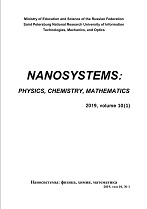|
CHEMISTRY AND MATERIAL SCIENCE
Study of the resistive switching and electrode degradation in Al/TiO$_2$/FTO thin films upon thermal treatment in reducing atmosphere
G. A. Illarionova, D. S. Kolchanova, V. V. Chrishtopa, I. A. Kasatkinb, A. V. Vinogradova, M. I. Morozova
a ITMO University, Kronverkskiy prosp., 49, St. Petersburg, 197101, Russia
b Saint Petersburg State University, Universitetskaya nab. 7-9, St. Petersburg, 199034, Russia
Аннотация:
Application of sol-gel derived titania nanoparticles in memristive thin film devices has been a subject of several studies. The reported data on the functional properties and stability of such devices scatter considerably. Meanwhile, the role of post-fabrication treatment, such as annealing in reducing atmosphere, is still poorly investigated for this class of devices. In this study, the effects of thermal annealing in a reducing atmosphere on the resistive switching behavior and the morphological changes of the top electrode during the electroforming process have been systematically addressed for the samples of Al/TiO$_2$/FTO thin film memristors prepared using sol-gel derived titania. Manifestations of several phenomena affecting the functional stability of these thin films, such as electrode delamination and collapse due to formation of gas bubbles, appearance of electrochemical patterns at the electrode surface, and morphological changes induced by the electroforming process have been systematically established in relation with the various conditions of thermal treatment in a reducing atmosphere.
Ключевые слова:
TiO$_2$, memristors, electrode degradation.
Поступила в редакцию: 25.11.2021
Образец цитирования:
G. A. Illarionov, D. S. Kolchanov, V. V. Chrishtop, I. A. Kasatkin, A. V. Vinogradov, M. I. Morozov, “Study of the resistive switching and electrode degradation in Al/TiO$_2$/FTO thin films upon thermal treatment in reducing atmosphere”, Наносистемы: физика, химия, математика, 12:6 (2021), 783–791
Образцы ссылок на эту страницу:
https://www.mathnet.ru/rus/nano1074 https://www.mathnet.ru/rus/nano/v12/i6/p783
|

| Статистика просмотров: |
| Страница аннотации: | 65 | | PDF полного текста: | 30 |
|




 Обратная связь:
Обратная связь: Пользовательское соглашение
Пользовательское соглашение
 Регистрация посетителей портала
Регистрация посетителей портала Логотипы
Логотипы








 Цитирование в формате
Цитирование в формате 